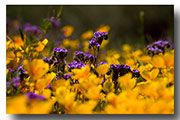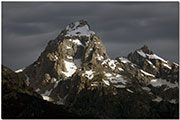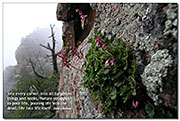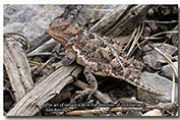Nature A-B
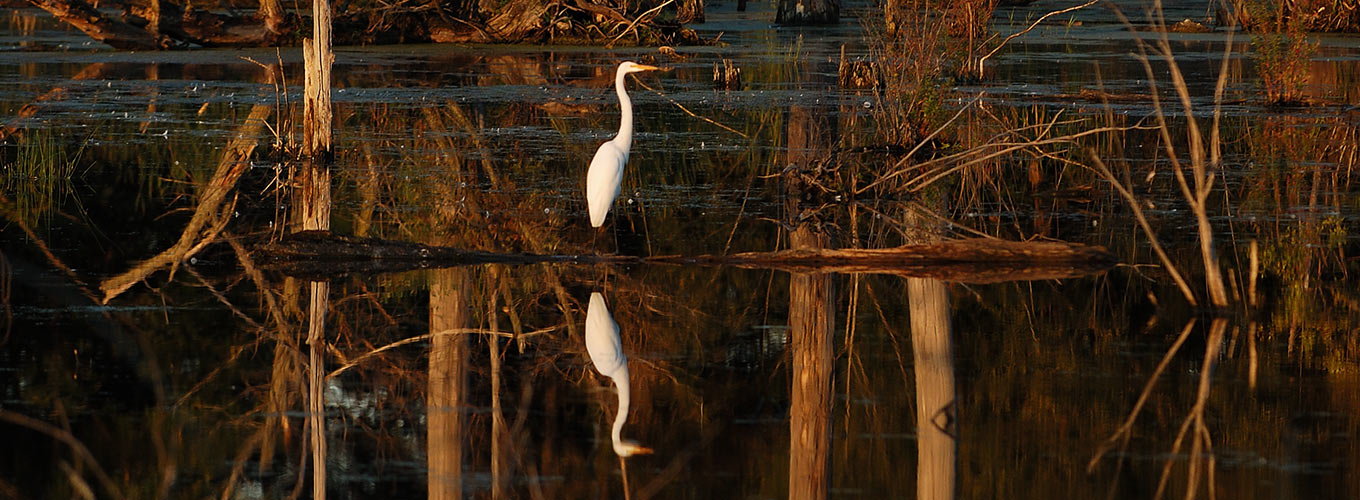
“Nature is what wins in the end.” Abby Adams
“Now that we’re essentially an indoor species, walled off from the world of other life forms, we’re divorced from the very domain that supports and sustains our lives.” Charles Cook
Hopefully, this collection of quotes about nature will help you touch some of that world from which we have become divorced. Now only quotes that can be authenticated are added to this collection. There are five pages in this collection, alphabetized by author last name. Since this is an ongoing project, older, unauthenticated quotes are researched as time permits. If you have a favorite you think should be added, drop me a note.
Nature Quotes A-B For other pages, click the links below
I hold no preference among flowers, so long as they are wild, free, spontaneous.
Edward Abbey (1927-1989)- Desert Solitaire “Cliffrose and Bayonets”, p. 25 (1968)
Gallery of Nature Quotes
There are no vacant lots in nature.
Edward Abbey (1927-1989)- Desert Solitude, “The First Morning,” p.6, Ballantine Books, NY, NY, 1968, p6.
Growth for the sake of growth is the ideology of the cancer cell.
Edward Abbey (1927-1989) – The Journey Home: Some Words in Defense of the American West (1977) The Rape of the West p. 183
Nature is indifferent to our love, but never unfaithful.
Edward Abbey (1927-1989) – A Voice Crying in the Wilderness, Notes from a Secret Journal, 1989, Ch,9 p86
Nature neither gives nor expects mercy.
Diane Ackerman (1948 -) – The Moon by Whale Light: And Other Adventures Among Bats, Penguins, Crocodilians, and Whales, Random House, NY,NY, 1991, 239-240.
Nature is also great fun. To pretend that nature isn’t fun is to miss much of the joy of being alive.
Diane Ackerman (1948 -) – The rarest of the rare: Vanishing Animals, Timeless Worlds, Introduction, Vintage Books, NY, NY, p.xx, 1997
Nature is what wins in the end.
Abby Adams (1902-1984) – The Gardener’s Gripe Book, Workmans Publishing, NY, NY, 1995, p. 10.
No matter how sophisticated you may be, a large granite mountain cannot be denied — it speaks in silence to the very core of your being.
Ansel Adams (1902-1984) – Exhibition at the Corcoran Gallery, Washington, D.C.
Gallery of Nature Quotes
The only things in my life that compatibly exist with this grand universe are the creative works of the human spirit.
Ansel Adams (1902-1984) – Ansel Adams: An Autobiography
Chaos was the law of nature; Order was the dream of man.
Henry Brooks Adams (1838-1918) – The Education of Henry B. Adams, p. 1132, The Library of America (1983)
If there’s a power above us,
(And that there is all nature cries aloud
Through all her works,) he must delight in virtue.
Joseph Addison (1672-1719) – Cato, Act V, Scene I, J Dicks, London, 1883
Nature delights in the most plain and simple diet.
Joseph Addison (1672-1719) – The Spectator, Vol I, 1826, No 162, p. 255
As long as men inquire, they will find opportunities to know more upon these topics than those who have gone before them, so inexhaustibly rich is nature in the innermost diversity of her treasures of beauty, order and intelligence.
Jean Louis Rodolphe Agassiz (1807-1873) – The Spectator, Vol VII, No. 477, September 6, 1712, pp 19-20.
The eye of the trilobite tells us that the sun shone on the old beach where he lived; for there is nothing in nature without a purpose, and when so complicated an organ was made to receive the light, there must have been light to enter it.
Jean Louis Rodolphe Agassiz (1807-1873) – Geological Sketches, ch. 2, 1866
Lay aside all conceit. Learn to read the book of nature for yourself. Those who have succeeded best have followed for years some slim thread which has once in a while broadened out and disclosed some treasure worth a life-long search.
Jean Louis Rodolphe Agassiz (1807-1873) – Popular Science Monthly, Quoted by David Stair Jordan, Vol 40, 1891
Nature is the armory of genius. Cities serve it poorly, books and colleges at second hand; the eye craves the spectacle of the horizon; of mountain, ocean, river and plain, the clouds and stars; actual contact with the elements, sympathy with the seasons as they rise and roll.
Amos Bronson Alcott (1799-1888) – The Journals of Bronson Alcott, January, p. 187, Little Brown & Co., Boston MA, 1938.
Nature is thought immersed in matter. . .
Amos Bronson Alcott (1799-1888) – “Pantheon,” The Journal of Speculative Philosophy, Vol II, No 1, 1868 (p. 47)
Wild roses are fairest, and nature a better gardener than art.
Louisa May Alcott (1832-1888) – A Long Fatal Love Chase, 1866, Dell Publishing reprint, 1995, p 11.
Nature hath nothing made so base, but can read some instruction to the wisest man.
Charles Aleyn (died 1640) -Quoted in: A dictionary of thoughts: being a cyclopedia of laconic quotations from the best authors of the world, both ancient and modern, edited by Tryon Edwards, 1908. Quote improperly attributed to Tryon Edwards.
Nature is the art of God – LA NATURA E L’ARTE DI DIO
Attributed to Dante Alighieri but it is not found in the exact wording in the Devine Comedy. A similar statement can be found in Purgatorio, Canto XI, Lines 94-96: “Art, as far as it is able, follows nature, as a pupil imitates his master; so your art must be, as it were , God’s grandchild.” (See also Sir Thomas Browne, below) ) The Divine comedy: Purgatorio (Canto X, Line 94.)
Every landscape is, as it were, a state of the soul, and whoever penetrates into both is astonished to find how much likeness there is in each detail.
Henri Frédéric Amiel (1821-1881) –The Private Journal of Henri Frédéric Amiel, Tr. H. Ward, October 31, 1852,
Nature has been for me, for as long as I remember, a source of solace, inspiration, adventure, and delight; a home, a teacher, a companion.
Lorraine Anderson (1952 – ) – Quoted in The 12 Secrets of Highly Creative Women, Gail McMeekin, Conari Press, 2000, p27.
In all things of nature there is something of the marvelous.
Aristotle (384 BC-322 BC) – Parts of Animals I.645a16
Nature makes nothing incomplete, and nothing in vain.
Aristotle (384 BC-322 BC) – Politics I. Tr Benjamin Jowett, 1256 b Part VIII
Nature has been defined as a ‘principle of motion and change’, and it is the subject of our inquiry. We must therefore see that we understand the meaning of ‘motion;’ for if it were unknown, the meaning of ‘nature’ too would be unknown.
Aristotle (384 BC-322 BC) – Physics, Book III, Section I 200b.
But Nature flies from the infinite, for the infinite is unending or imperfect, and Nature ever seeks an end.
Aristotle (384 BC-322 BC) – Generation of Animals I.715b15
If one way be better than another, that you may be sure is Nature’s way.
Aristotle (384 BC-322 BC) – Nicomanachean Ethics, 1099B, 23
There is more both of beauty and of raison d’etre in the works of nature- than in those of art.
Aristotle (384 BC-322 BC) – De Partibus Animalium, I., 1, 5.
Those whose days are consumed in the low pursuits of avarice, or the gaudy frivolties of fashion, unobservant of nature’s loveliness of demarcation, nor on which side thereof an intermediate form should lie.
Aristotle (384 BC-322 BC) –The History of Animals, Book VIII, Part 1, tr. D’Arcy Wentworth Thompson
Mountains inspire awe in any human person who has a soul. They remind us of our frailty, our unimportance, of the briefness of our span on this earth. They touch the heavens, and sail serenely at an altitude beyond even the imaginings of a mere mortal.
Elizabeth Aston in The Exploits & Adventures of Miss Alethea Darcy: A novel, A.E. Books, 2005, p 103.
. . .nature indifferently copied is far superior to the best idealities.
John James Audubon – The Life and Adventures of John James Audubon, the Naturalist, Robert Buchanan, p. 140, (1868).
Men go forth to marvel at the height of mountains, and the huge waves of the sea, the broad flow of the rivers, the vastness of the ocean, the orbits of the stars, and yet they neglect to marvel at themselves. Variant: Men go abroad to admire the heights of mountains, the mighty billows of the sea, the broad tides of rivers, the compass of the ocean, and the circuits of the stars, and pass themselves by.
Augustine of Hippo (354–430) – Confessions (c. 397), Book 10, Chapter VIII.
A portent happens not contrary to nature, but contrary to what we know as nature.
Augustine of Hippo (354–430) – City of God, Book XXI, Chapter 8, Tr. Rev. M. Dods,
Death, like generation, is a secret of Nature.
Marcus Aurelius (121-180) – Meditations (c. 161–180 CE) IV, 5.
No form of nature is inferior to art; for the arts merely imitate natural forms. – Variant: There is no nature which is inferior to art, the arts imitate the nature of things.
Marcus Aurelius (121–180) – Meditations. xi. 10.
One cannot fix one’s eyes on the commonest natural production without finding food for a rambling fancy.
Jane Austen (1775-1817) – Mansfield Park, Chapter XXII, 1814
Nature is often hidden; sometimes overcome; seldom extinguished.
Sir Francis Bacon – Essays, “Of Nature, In Men,” (speaking of the nature of man) 1627
Art is man added to Nature.
Sir Francis Bacon – “”Descriptio Globi Intellectualis” (1612)
Nature to be commanded must be obeyed. Variant; …for nature is only to be commanded by obeying her.
Sir Francis Bacon (1561-1626) – Novum Organum (The New Organon) (1620) – bk. 1, aph. 135
The breath of flowers is far sweeter in the air than in the hand.
Sir Francis Bacon (1561-1626) – Bacon’s Essays, “Of Gardens,” 1627
In nature, things move violently to their place, and then calmly in their place.
Sir Francis Bacon (1561-1626) – Bacon’s Essays, “Of Great Place,” p. 27, 1627
Art is man added to Nature.
Sir Francis Bacon (1561-1626) -Descriptio Globi Intellectus, 1612
God Almighty first planted a garden. And indeed it is the purest of human pleasures. It is the greatest refreshment to the spirits of man; without which, buildings and palaces are but gross handiworks.
Sir Francis Bacon (1561-1626) – Essays, “Of Gardens,” 1627
Man, being servant and interpreter of Nature, can do and understand so much and so much only as he as observed in fact or thought of the course of nature; beyond this he neither knows anything nor can do anything.
Sir Francis Bacon (1561-1626) – The New Organon (1620) in James Spedding, Robert Ellis and Douglas Heath (eds.), The works of Francis Bacon (1877-1901), Vol 4, p. 47.
Art is man’s nature; nature is God’s art.
Phillip James Bailey – Festus, Pr the Jubilee revision, (1839)
What is Art, monsieur, but Nature concentrated?
Qu’est-ce que l’Art, monsieur? C’est la Nature concentrée.
Honoré de Balzac (1799-1850) – Illusions perdues, vol I, 1839, trans. Ellen Marriage, ch. I, section 5.
God gave us memory so that we might have roses in December.
J.M. Barrie – Speech delivered at St. Andrews University, 1922. Courage, The Tectoral Address Delivered. pg 1, 1922
Mother Nature presents neither a wrinkled face nor tottering form, but constantly renews the bloom of her youth, while time fills up the volumes of her history.
James Lendall Basford (1845-1915) – Sparks from the Philosopher’s Stone, Harvard University, 1882, p87
There are no sounds that can stir the sublime emotions of men’s souls like the sighs and whispers of nature.
James Lendall Basford (1845-1915) – Sparks from the Philosopher’s Stone, Harvard University, 1882, p79
The finest music is that which Nature plays on her leafy harps.
James Lendall Basford (1845-1915) – Seven Seventy Seven Sensations, 1897, p73
There are times in life when trouble brings us in such communion with nature that the rocks appear to be in sympathy with us, and the waving branches of the trees seem like angel hands fanning away our sorrows.
James Lendall Basford (1845-1915) – Seven Seventy Seven Sensations, 1897, p15.
Mother Nature should be broken-hearted when Science, her nearest offspring, fails to respect her.
James Lendall Basford (1845-1915) – Seven Seventy Seven Sensations, 1897, p20.
I was obliged, at last, to come to the conclusion that the contemplation of nature alone is not sufficient to fill the human heart and mind.
Henry Walter Bates (1825-1892) – The Naturalist on the River Amazons, Vol 2, ch 3, London, 1863, p. 186
Nature too unkind; that made no medicine for a troubled mind!
Francis Beaumont (1584-1616) and John Fletcher(1579-1625), The Works of Mr. Francis Beaumont, and Mr. John Fletcher, “Philaster; or, Love Lies a Bleeding,” Act III, Scene 1, p111, 1711.
For you teach very clearly by your behavior how slowly and how meagerly our senses proceed in the investigation of ever inexhaustible nature.
Giambatista Beccaria (1716-1781) – Elettricismo artificiale (1772), vii-viii, in Antonio Pace, Franklin and Italy, 1958, p. 58.
It is the end of art to inoculate men with the love of nature. But those who have a passion for nature in the natural way, need no pictures nor galleries. Spring is their designer, and the whole year their artist.
Henry Ward Beecher (1813-1887) – Star Papers, or Experiences of Art and Nature, “A Discourse of Flowers,” Beecher, Applewood Books, Bedford MA, 1855, p.94.
Believe me, you will find more lessons in the woods than in books. Trees and stones will teach you what you cannot learn from masters.
Experto crede: aliquid amplius invenies in silvis, quam in libris. Ligna et lapides docebunt te, quod a magistris audire non possis
Bernard of Clairvaux – St. Bernard – Epistola CVI, sect. 2; translation from Edward Churton The Early English Church ([1840] 1841) p. 324.
People who want to see the beauty of nature from motorboats and automobiles would obviously be just as pleased, and as fully recreated, at a drive-in movie.
Wendell Berry (1934 – ) The Unforseen Wilderness: An Essay on Kentucky’s Red River George, University Press of Kentucky, 1971
Touch the earth, love the earth, her plains, her valleys, her hills, and her seas; rest your spirit in her solitary places. For the gifts of life are the earth’s and they are given to all, and they are the songs of birds at daybreak, Orion and the Bear, and the dawn seen over the ocean from the beach.
Henry Beston (1888-1968) – “Lanterns on the Beach,” The Outermost House (1928)
Into every empty corner, into all forgotten things and nooks, Nature struggles to pour life, pouring life into the dead, life into life itself.
Henry Beston (1888-1968) – “Lanterns on the Beach,” The Outermost House (1928)
Gallery of Nature Quotes
When the Pleiades and the wind in the grass are no longer a part of the human spirit, a part of very flesh and bone, man becomes, as it were a kind of cosmic outlaw, having neither the completeness and integrity of the animal nor the birthright of a true humanity.
Henry Beston (1888-1968) (Attributed but not found in the 2024 Gutenberg edition of The Outermost House (1928)
The three great elemental sounds in nature are the sound of rain, the sound of wind in a primeval wood, and the sound of outer ocean on a beach.
Henry Beston (1888-1968) – “The Headlong Wave,”, The Outermost House, Chapter III, p 43, Rinehart & Co, NY, NY, (1928)
As well expect Nature to answer your human values as to come into your house and sit in a chair.
Henry Beston (1888-1968) – The Outermost House, Chapter X, p221, Rinehart & Co, NY, NY, (1928)
Nature always tends to act in the simplest way.
Attributed to Daniel Bernoulli (1700-1782) – Essay on the Brachistochrone, Acta Eruditorum, May 1697
Nature is just enough; but men and women must comprehend and accept her suggestions.
Antoinette Brown Blackwell (1825-1921) – “Sex and Evolution,” in The Neglected Canon: Nine Women Philosophers: First to the Twentieth Century, ed Dykeman, Kluwer Academic Publishers, 1999, p. 350
The tree which moves some to tears of joy is in the eyes of others only a green thing that stands in the way. Some see nature all ridicule and deformity . . . and some scarce see nature at all. But to the eyes of the man of imagination, nature is imagination itself.
William Blake (1757-1827) – The Letters of William Blake, ed Geoffrey Keynes (1956,) Letter to Rev. Dr. Trusler, August 23, 1799
In Nature nothing remains constant. Everything is in a perpetual state of transformation, motion and change.
David Bohm (1917-1992) – Causality and Chance in Modern Physics, Chapter 1, p1, University of Penn. Press, 1957
Nature always springs to the surface and manages to show what she is. It is vain to stop or try to drive her back. She breaks through every obstacle, pushes forward, and at last makes for herself a way.
Nicolas Boileau-Despréaux (1636-1711) Quoted in Treasury of Thought Forming an Encyclopædia of Quotations from Ancient and Modern Authors ,By Maturin Murray Ballou · 1894, p. 359.
Our imagination. . .is equally confounded by what is infinitely great or infinitely small.“L’esprit humain se perd dans ces immensités; … il est également étonné de l’infiniment grand et de l’infiniment petit.” Tr by ChatGPT: “The human mind is lost in these immensities; . . . it is equally astonished by the infinitely great and the infinitely small.”
Charles Bonnet (1720-1793 ) Quoted or phrased by Felix Archimede Pouchet, MD in: The Universe, Or, The infinitely Great and the Infinitely Little, The vegetable Kingdom, Chapter II, Blackie & Son, London, 1870, Book 1, p.3. Original from Bonnet’s Contemplation de la naature (1764), Vol 1.
Gallery of Nature Quotes
Man is wise and constantly in quest of more wisdom; but the ultimate wisdom, which deals with beginnings, remains locked in a seed. There it lies, the simplest fact of the universe and at the same time the one which calls forth faith rather than reason.
Hal Borland (1900-1978) – “The Certainty – April 5,” Sundial of the Seasons (1964)
There are no idealists in the plant world and no compassion. The rose and the morning glory know no mercy. Bindweed, the morning glory, will quickly choke its competitors to death, and the fence row rose will just as quietly crowd out any other plant that tried to share its roothold. Idealism and mercy are human terms and human concepts.
Hal Borland (1900-1978) – Book of Days, 22 July, 1976.
There are some things, but not too many, toward which the countryman knows he must be properly respectful if he would avoid pain, sickness and injury. Nature is neither punitive nor solicitous, but she has thorns and fangs as wells as bowers and grassy banks.
Hal Borland (1900-1978) – Beyond your Doorstep: A handbook to the Country, Ch. 13, p. 303, 1962
Nature seems to look after her own only up to a certain point; beyond that they are supposed to fend for themselves.
Hal Borland (1900-1978) – The Enduring Pattern, “Life, Flesh and Blood: Amphibians,” (p.185), Simon & Schuster, NY, NY, 1959
Nothing in nature is as simple as it sometimes seems when reduced to words.
Hal Borland (1900-1978) – The Enduring Pattern, “Life, Flesh and Blood: Reptiles,” (p.189), Simon & Schuster, NY, NY, 1959
Nature always looks out for the preservation of the universe.
Robert Boyle (1627-1691 ) – A free Enquiry into the Vulgarly Received Notion of Nature, Section IV, Cambridge University Press, 1996, p 31
It is one thing to be able to help nature produce things, and another thing to understand well the nature of the things produced.
Robert Boyle (1627-1691 ) The Sceptical Chymist, The Third Part, p.73.
Man masters nature not by force, but by understanding.
Jacob Bronowski (1908-1974) – “The Creative Mind,” Science and Human Values (1956), Lecture given at MIT, Feb 26, 1953
Nature is the art of God – LA NATURA E L’ARTE DI DIO
Sir Thomas Browne (1605-1682) Religio Medici, 1643. Attributed to Dante Alighieri but it is not found in the exact wording in the Devine Comedy. A similar statement can be found in Purgatorio, Canto XI, Lines 94-96: “Art, as far as it is able, follows nature, as a pupil imitates his master; so your art must be, as it were , God’s grandchild.” The Divine comedy: Purgatorio (Canto X, Line 94.) See the full quote from Sir Thomas Browne below.
Gallery of Nature Quotes
Now nature is not at variance with art, nor art with nature, they being both servants of his providence: art is the perfection of nature; were the world now as it was the sixth day, there were yet a chaos; nature hath made one world, and art another. In brief, all things are artificial; for nature is the art of God.
Sir Thomas Browne (1605-1682) – Religio Medici, Part 1, (sec. 16) 1642 – See also Dante Alighieri, above
Thus there are two books from whence I collect my Divinity; besides that written one of God, another of his servant Nature, that universal and public Manuscript, that lies expans’d unto the eyes of all; those that never saw him in the one, have discovered him in the other.
Sir Thomas Browne (1605-1682) – Religio Medici, Part 1, Section 16., 1642
Natura nihil agit frustra [Nature does nothing in vain] is the only indisputable axiom in philosophy. There are no grotesques in nature; not any thing framed to fill up empty cantons, and unnecessary spaces.
Sir Thomas Browne (1605-1682) – Religio Medici, Part 1, Section 15 in Thomas Browne and Simon Wilkin (Ed.), The Works of Thomas Browne (1852), Vol 2, p 339. Quoting the axiom from Aristotle. See also Isaac Newton quoting the same axiom.
Nature is none other than God in all things.
Giordano Bruno (1548-1600) – Quoted in Elements of Pantheism (2004), Paul A. Harrison
Nature does not tolerate the whimsical and the inane; all her structures are on principles, and she allows no others.
J. Ingram Bryan (1868-1953) – The Interpretation of Nature in English Poetry, Ch 1 (p. 6) Tokyo, Japan, 1932
Go forth under the open sky, and list
to Nature’s teachings.
William Cullen bryant (1794-1878) – “Thanatopsis,” in Poems you ought to Know, Ed Elia W. Peattie, Fleming Revell Co, London, 1902, p112.
T0 him who in the love of Nature holds
Communion with her visible forms, she speaks
a various language.
William Cullen bryant (1794-1878) – “Thanatopsis,” in Poems you ought to Know, Ed Elia W. Peattie, Fleming Revell Co, London, 1902, p112.
The great workman of nature is time.
George-Louis Leclerc, Comte de Buffon (1707-1788) – ‘Histoire Naturelle, Générale et Particulière, 1756, Quoted in Jacques Rooger, The Life Sciences in Eighteenth-Century French Thought, ed K. Benson, tr R. Ellrich, 1997, p468.
Nature is the system of laws established by the Creator for the existence of things and for the succession of creatures. Nature is not a thing, because this thing would be everything. Nature is not a creature, because this creature would be God. But one can consider it as an immense vital power, which encompasses all, which animates all, and which, subordinated to the power of the first Being, has begun to act only by his order, and still acts only by his concourse or consent . . . Time, space and matter are its means, the universe its object, motion and life its goal.
George-Louis Leclerc, Comte de Buffon (1707-1788) – ‘De La Nature: Premiere Vue’, Historie naturelle, generale et particuliere avec la descritpion du cabinet du roi (1764), Vol 12, iii-1v. Tr Phillip R. Sloan
All scientists have found that preconceived notions, dogmas, and all personal prejudice and bias, must be set aside, listening patiently, quietly and reverently to the lessons, one by one, which Mother Nature has to teach, shedding light on that which was before a mystery, so that all who will may see and know. She conveys her truths only to those who are passive and receptive.
Luther Burbank (1849-1926) – “How to Produce New Trees, Fruits and Flowers,” Proceedings of the American Pomological Society, Session of 1895, Volumes 24-26, Twenty-Fourth Session, p. 59.
The serenity produced by the contemplation and philosophy of nature is the only remedy for prejudice, superstition, and inordinate self-importance, teaching us that we are all a part of Nature herself, strengthening the bond of sympathy which should exist between ourselves and our brother man. . .
Luther Burbank (1849-1926) – “How to Produce New Trees, Fruits and Flowers,” Proceedings of the American Pomological Society, Session of 1895, Volumes 24-26, Twenty-Fourth Session, p. 61.
Nature’s law affirm instead of prohibit. If you violate her laws, you are your own prosecuting attorney, judge, jury, and hangman.
Luther Burbank (1849-1926) – The Harvest of the Years, Luther Burbank, Wilbur Hall, Houghton Mifflin company, 1931, p. 267.
Nature is never more truly herself, than in her grandest form.
Edmund Burke (1729-1797) – The works of the Right Hon. Edmund Burke: With a Biographical and Critical Introduction, “Letters on a Regicide Peace,” Holdsworth & Ball, London, 1834, p. 324.
Look abroad through Nature’s range,
Nature’s mighty law is change.
Robert Burns (1759-1796) – Let not woman e’er complain, 1794.
. . . in the order of nature we may behold the ways of the Eternal.
John Burroughs (1837-1921) – The Light of Day, Houghton, Mifflin, 1900, p. 50.
Nature teaches more than she preaches. There are no sermons in stones. It is easier to get a spark out of a stone than a moral.
John Burroughs (1837-1921) – Time and Change, XII The Gospel of Nature, p. 247.
One of the hardest lessons we have to learn in this life, and one that many persons never learn, is to see the divine, the celestial, the pure, in the common, the near at hand – to see that heaven lies about us here in this world.
John Burroughs (1837-1921) – “The Divine Soil,” The Atlantic Monthly, April, 1908, p 440.
Nature exists for man no more than she does for monkeys, and is as regardless of his life or pleasure or success as she is of the fleas. Her waves will drown him, her fire burn him, and her earth devour him, her storms and lightning smite him, as if he were only a dog.
John Burroughs (1837-1921) – The Heart of Burrough’s Journals, Jan 17, 1866, p. 46, Houghten Mifflin Co., Boston, 1928
Nature will not be conquered, but gives herself freely to her true lover — to him who revels with her, bathes in her seas, sails her rivers, camps in her woods, and with no mercenary ends, accepts all.
John Burroughs (1837-1921) – The Heart of Burrough’s Journals, Jan 17, 1866, p. 46, Houghten Mifflin Co., Boston, 1928
Nature is not benevolent; Nature is just, gives pound for pound, measure for measure, makes no exceptions, never tempers her decrees with mercy, or winks at any infringement of her laws.
John Burroughs (1837-1921) – Harvest of a Quiet Eye: The Natural World of John Burroughs, The Gospel of Nature, 5 (p. 149, 1976
To the scientist Nature is a storehouse of facts, laws, processes; to the artist she is a storehouse of pictures; to the poet she is a storehouse of images, fancies, a source of inspiration; to the moralist she is a storehouse of precepts and parables; to all she may be a source of knowledge and joy.
John Burroughs (1837-1921) – “The Art of Seeing Things,” Leaf and Tendril (1908)
The art of nature is all in the direction of concealment.
John Burroughs (1837-1921) – “The Art of Seeing Things,” Leaf and Tendril (1908)
Gallery of Nature Quotes
The life of nature we must meet halfway; it is shy, withdrawn, and blends itself with a vast neutral background. We must be initiated; it is an order the secrets of which are well guarded.
John Burroughs (1837-1921)- “The Art of Seeing Things,” Leaf and Tendril (1908)
There is a pleasure in the pathless woods,
There is a rapture on the lonely shore,
There is society, where none intrudes,
By the deep sea, and music in it’s roar:
I love not Man the less, but Nature more.
Lord Byron (1788-1824) – “Childe Harold’s Pilgrimage,” Canto IV, CLXXVIII, The complete works of Lord Byron, Galignani And Co., Paris, 1841, p. 146.
- David Alan
- Last Updated February 18, 2026
